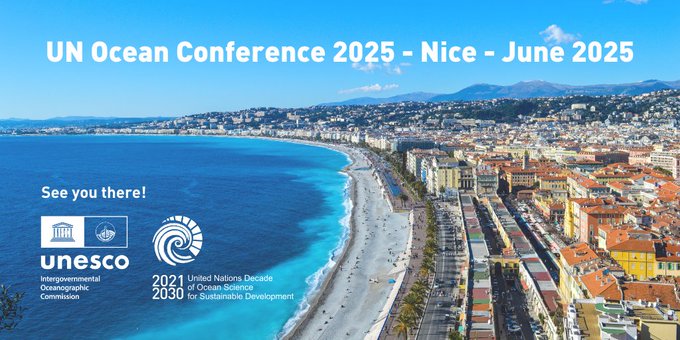The third United Nations Ocean Conference (UNOC3), co-hosted by France and Costa Rica, will take place from June 9 to 13, 2025, in Nice, marking a pivotal milestone in global efforts to protect and sustainably manage the world’s oceans. As the health of marine ecosystems continues to decline due to climate change, pollution, and unsustainable practices, UNOC3 comes at a critical time to galvanize international cooperation, innovation, and concrete action toward Sustainable Development Goal 14 (SDG 14): Life Below Water.
A Global Mandate for a Sustainable Blue Future
UNOC3 aims to accelerate global commitments to conserve and sustainably use the oceans, seas, and marine resources. Bringing together a diverse coalition of stakeholders—including governments, UN bodies, NGOs, civil society, academia, Indigenous groups, local communities, financial institutions, philanthropies, and the private sector—the conference will serve as a high-level political and scientific platform for charting a sustainable future for the ocean.
The outcomes of this gathering are expected to shape international ocean governance, with the adoption of the “Nice Ocean Action Plan”, an outcome document designed to be both action-oriented and concise. It will be supported by a catalog of voluntary commitments aimed at delivering tangible progress in protecting marine ecosystems and promoting sustainable ocean economies.
Key Focus Areas of UNOC3
UNOC3 will center on:
- Strengthening global ocean governance
- Accelerating the implementation of SDG 14
- Supporting sustainable blue economy models
- Promoting science-based decision-making
- Fostering inclusive participation from underrepresented communities and youth
- Encouraging investments in marine conservation and innovation
The conference will feature plenary sessions for UN Member States and dynamic Ocean Action Panels that will showcase best practices, new coalitions, and multi-sectoral partnerships aimed at delivering measurable impacts.
Strategic Events Leading Up to UNOC3
In the days before the main event, a series of strategic side forums and summits will take place to deepen discussions and lay the groundwork for commitments:
- One Ocean Science Congress (June 4–6, Nice): A scientific forum spotlighting breakthroughs in ocean research, technology, and climate resilience.
- Blue Economy and Finance Forum (BEFF) (June 7–8, Monaco): Co-organized by the Prince Albert II of Monaco Foundation, this B2B platform will highlight scalable, profitable solutions that contribute to ocean health and economic growth.
- Ocean Rise & Coastal Resilience Coalition (June 7, Nice): A special event focused on coastal adaptation, nature-based solutions, and support for small island states and vulnerable coastal regions.
Civil Society Mobilization and the “Let’s Be Nice to the Ocean” Campaign
The Ocean & Climate Platform, mandated by the co-hosting governments, has played a central role in engaging civil society and mobilizing grassroots support for UNOC3. Through its “Call to All Voices of the Ocean”, the platform has conducted global consultations to include perspectives from coastal communities, youth, Indigenous leaders, and ocean advocates. These efforts are amplified by the “Let’s Be Nice to the Ocean” campaign, encouraging citizens worldwide to take action in favor of ocean sustainability.
Hydrogen Bunkering, Blue Finance, and Innovation
UNOC3 is expected to spotlight groundbreaking technological developments, such as hydrogen-powered vessels, ocean-based renewable energy, and ocean data platforms. The Port of Amsterdam recently made headlines with the world’s first liquid hydrogen bunkering for a superyacht—Feadship’s 118.8m Breakthrough—underscoring the need for innovation in maritime decarbonization.
Meanwhile, forums like BEFF will explore how sustainable finance can scale nature-positive blue economy solutions, ensuring both economic growth and the protection of marine biodiversity.
A Historic Opportunity
As the world’s third UN Ocean Conference, UNOC3 represents a historic opportunity to move from promises to impact-driven results. In the words of Olivier Wenden, Vice-Chairman and CEO of the Prince Albert II of Monaco Foundation:
“If we want a sustainable ocean economy, we must invest in solutions that work—solutions that are scalable, profitable, and regenerative.”
The conference also acts as a bridge to future frameworks, feeding into the Global Biodiversity Framework, the High Seas Treaty, and broader climate and development goals.
Conclusion
As global attention turns to the Mediterranean coast of France this June, the world will be watching. The 2025 United Nations Ocean Conference in Nice is not just a diplomatic milestone—it is a call to action. With the fate of the world’s ocean at stake, UNOC3 is poised to set the course for a new era of marine stewardship, innovation, and equity.





